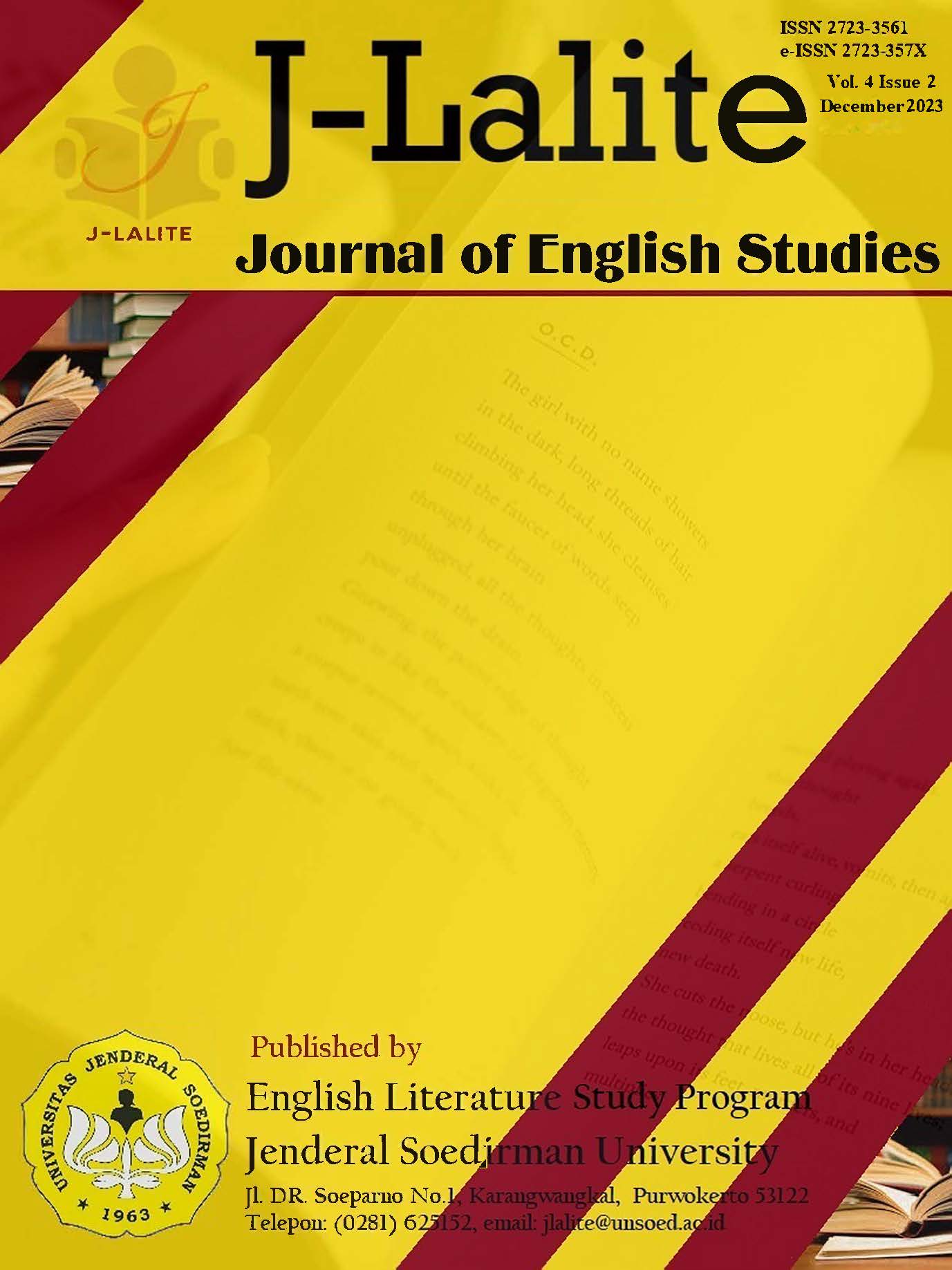The Stages of Grief and Response of Cameron Turner in Confronting Death depicted in Benjamin Cleary's Swan Song
Abstract
The underlying theory of grief is rooted in understanding the concept of loss. Stages of grief define the journey of accepting the reality of loss. Elisabeth Kübler-Ross shows these stages of grief by interviewing a terminally ill patient who was confronting the end-of-life transition. Stages of grief consist of denial, anger, bargaining, depression, and acceptance. Throughout the end-of-life transition, some may have a different response to grief at certain stages. This study aims to identify the stages of grief and the response to grief that Cameron Turner, the Swan Song film's main character, portrays. The data analysis exercises the qualitative descriptive method. The steps were watching the film and reading the script, identifying the data, classifying the data, reducing the collected data from the film and script, and analyzing the data. The findings of this study show that Cameron Turner was going through a complete grief stage of denial, anger, bargaining, and depression down to the acceptance stage. To respond to each stage, Cameron had a variety of modes of expression that differed in each of the stages of grief, such as verbal response, nonverbal response, physical response, and physical activities
References
Bernard, José Eduardo Rondón. “Depression: A Review of Its Definition.” MOJ Addiction Medicine & Therapy, vol. 5, no. 1, MedCrave Group, Jan. 2018, https://doi.org/10.15406/mojamt.2018.05.00082
Bonevski, Dimitar, and Andromahi Naumovska. (2020). “Panic Attacks and Panic Disorder.” IntechOpen eBooks, https://doi.org/10.5772/intechopen.86898.
Corless, Inge B., et al. (2014). “Languages of Grief: A Model for Understanding the Expressions of the Bereaved.” Health Psychology and Behavioral Medicine, vol. 2, no. 1, Taylor and Francis, Jan. pp. 132–43. https://doi.org/10.1080/21642850.2013.879041.
Corr, Charles A. (2021). “Should We Incorporate the Work of Elisabeth Kübler-Ross in Our Current Teaching and Practice and, if so, How?” Omega - Journal of Death and Dying, vol. 83, no. 4, SAGE Publishing, Sept. pp. 706–28. https://doi.org/10.1177/0030222819865397.
Cruz, D. T. (2014). Literature and Film: A Brief Overview of Theory and Criticism. https://doi.org/10.1057/9781137439734_3
Hossain, Md. (2017). “Psychoanalytic Theory Used in English Literature: A Descriptive Study.” Global Journal of Human -Social Science, vol. 17, no. 1, pp. 41–46.
Kübler-Ross, Elisabeth, and David A. Kessler. (2005). On Grief and Grieving: Finding the Meaning of Grief Through the Five Stages of Loss. ci.nii.ac.jp/ncid/BB00981106.
Novaco, Raymond W. (2020). "Grief." Encyclopedia of Personality and Individual Differences, edited by Virgil Zeigler-Hill and Todd K. Shackelford. Springer ebooks. pp. 166-171.
Rimiru, Teresa Nyawira and Mokua, Maroko Gilbert. (2020). “Denial in Bereavement.” International Journal for Innovation Education and Research, vol. 8, no. 10, Oct., pp. 68–73. https://doi.org/10.31686/ijier.vol8.iss10.2655.
Ritchie, Timothy D. (2014) "Denial." Encyclopedia of Deception, edited by Timothy R. Levine, vol. 1, SAGE Publications, . pp 278-280.
Stroebe, Margaret, et al. (2020). "Grief." Encyclopedia of Personality and Individual Differences, edited by Virgil Zeigler-Hill and Todd K, Shackelford, Springer eBooks, pp. 1843-1847.

This work is licensed under a Creative Commons Attribution-ShareAlike 4.0 International License.
By submitting the manuscript, the author(s) agreed to these following terms:
(1) The copyright of received articles shall be assigned to J-Lalite: Journal of English Studies as the publisher of the journal. The intended copyright includes the right to publish articles in various forms (including reprint). J-Lalite: Journal of English Studies maintain the publishing rights to the published articles.
(2) Author(s) are permitted to disseminate published articles by sharing the link/DOI of the article at J-Lalite: Journal of English Studies. Author(s) are allowed to use their articles for any legal purposes deemed necessary without written permission from J-Lalite: Journal of English Studies with an acknowledgement of initial publication to this journal.
(3) Authors should sign a copyright transfer agreement when they have approved the final proofs sent by J-Lalite: Journal of English Studies prior to the publication.
(4) User/public use of this website will be licensed to Creative Commons Attribution-ShareALike 4.0 International (CC BY-SA 4.0) License.








.png)
.png)
.png)
.png)




